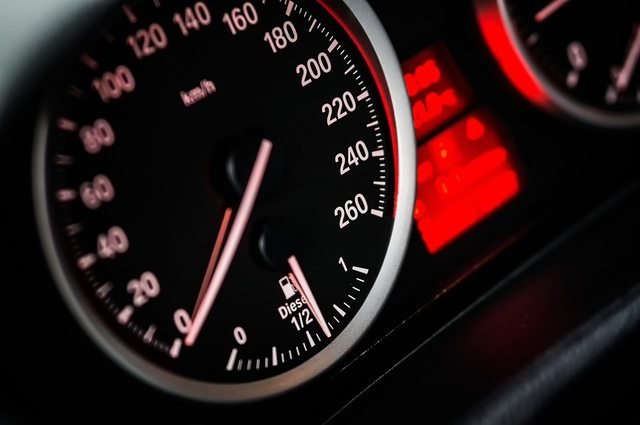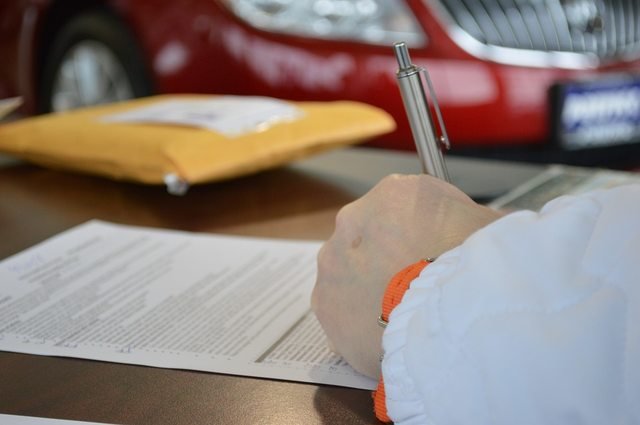The average new car price was up 2% from the same time last year.

This follows a similar increase of 2.6% from April 2014 to April 2015, according to a report by USA Today from last year that was based on Kelley Blue Book's official numbers for that year. The report is quick to point out that there are a number of reasons for this, from new and refurbished models being brought to market to replace older models and new customers being inclined to purchase more options, but is that really all there is to it? Surely people opting for XM Radio and on-board wifi can't account for a significant, consistent increase over the last two years.
Well, as it turns out, that same report points out a couple of significant reasons as to why this is the case: increasingly stringent fuel-efficiency regulations and new regulations concerning increased safety. As the federal government here in the good ol' US of A has continued to press on auto manufacturers to make their vehicles more fuel efficient to satisfy arbitrary miles-per-gallon numbers, manufacturers have had to invest more in researching and developing novel ways to meet these goals. Before anyone gets the idea to be happy about this, it should go without saying that this cost is passed on to the consumer. Same thing goes with airbags; since the federal government has a monopoly on safety standard ratings for motor vehicles, car makers have to build their cars to what amount to additional non-regulatory government regulations. Why do this? Well, would you buy a car with a really poor safety rating from the NHTSA?
With many safety options and drive train options essentially becoming industry standards, this necessarily drives prices up. It also reduces choice for the consumer, which is the flip side to this; more on that in just a minute. With just about every car coming standard with a dozen airbags, a fuel-efficient drive train, and various emissions control technologies from the factory, consumers now have to buy all of these features. Whereas it was possible to not jump for the car with the most bells and whistles if you were on a budget even as recently as ten years ago, now you don't have a choice. The bells and whistles are drilled and riveted on, and there's no getting rid of them. Only thing you, as a consumer, can do is sign on the dotted line to finance it.

Which brings me to that point I was going to tell you about earlier: more people than ever are financing their cars. This shouldn't be any surprise, since the average cost of a motor vehicle in the US has continued to increase. What is surprising is the staggering volume of debt now held for cars: as of August 2015, auto loans accounted for $1 trillion. As the price of a new car continues to rise, so will the total amount of debt held by American consumers purchasing new autos. Couple that with the hideous monstrosity that was Cash for Clunkers, and now you have more Americans than ever that have to buy new autos.
It's a vicious cycle. At least in the housing crisis that came to a head in 2008, the government wasn't cutting off people's options and funneling them into new homes. Market distortions are a real bitch when they're coupled with reducing consumer options.

Andrei Chira is a vaper, voluntaryist, and all-around cool dude. Formerly a paratrooper in the 82nd Airborne Division, he now spends his time between working at VapEscape in Montgomery County, Alabama, contributing to Seeds of Liberty on Facebook and Steemit, writing short fiction, and expanding his understanding of...well, everything, with an eye on obtaining a law degree in the future.
Why?
Unions
...and gooberment regulations.
Downvoting a post can decrease pending rewards and make it less visible. Common reasons:
Submit
That's basically the TL;DR version of it. I also tossed in Cash for Clunkers in there because the net effect was reducing cheap used cars from the market for first-time or low-income buyers.
Downvoting a post can decrease pending rewards and make it less visible. Common reasons:
Submit
government 'program', same as regulation. Government befouls eveything it touches.
My first car cost me $75 (1959 VW bug purchased in 1969)...I probably put ten thousand miles on that thing the first years. When I broke I could usually fix it myself.
It was eventually turned into a dune buggy.
I'd buy it again..today...If I could.
Downvoting a post can decrease pending rewards and make it less visible. Common reasons:
Submit
Oh I know it. It ain't called Leviathan for nothing.
My first car was a 1973 Mercedes-Benz 280, with the dual-overhead-cam inline six. Phenomenal car. Sure, the power window switches were garbage, but I'd buy that car again in a heartbeat.
Downvoting a post can decrease pending rewards and make it less visible. Common reasons:
Submit
you had windows?
Downvoting a post can decrease pending rewards and make it less visible. Common reasons:
Submit
They were stuck in the up position pretty much the whole time, but yeah. I had windows.
Downvoting a post can decrease pending rewards and make it less visible. Common reasons:
Submit
I have never, ever been able to afford a brand new car, and the way things are going I'll never be able to. Every single vehicle I have ever owned has been older than dirt and bombed out to shit. The only exception to this was a 2000 Pontiac Grand Am that I got one year off lease from an auto auction because my grandfather had a dealer's license. I ran that thing, literally, into the ground. Even six years after its demise, I still think I owe my family a few payments on it.
Downvoting a post can decrease pending rewards and make it less visible. Common reasons:
Submit
Financing used cars is pretty much going to be the go-to method for first time buyers or people without a lot of money. With the exception of my wife's car, every car I owned I paid cash for and bought for $3k or less (one of my favorites, my '91 Crown Victoria, I paid $800 dollars for and got a complete car that never needed service). That's pretty much being phased out, little by little.
Downvoting a post can decrease pending rewards and make it less visible. Common reasons:
Submit
http://www.howtowinincourt.com/?refercode=SB0027
http://marcstevens.net
There are all the law degrees you'll need.
Downvoting a post can decrease pending rewards and make it less visible. Common reasons:
Submit
I'm looking to have it so other people will come to me for legal advice. I love Marc Stevens and what he's doing with the No State Project, but like a buddy of mine said: a piece of paper might just be a piece of paper, but other people might prefer if you had it.
Downvoting a post can decrease pending rewards and make it less visible. Common reasons:
Submit
Yes, I agree, that jurisdictionary link is for your piece of paper, it lines out everything you need to know that doesn't have to be learned by doing.
It taught me how to write briefs and what not to put in them.
With enough folks pushing back maybe we won't need lawyers much longer.
Downvoting a post can decrease pending rewards and make it less visible. Common reasons:
Submit
There is a massive oversupply of lawyers now too... the education bubble is another big one coming up.
Downvoting a post can decrease pending rewards and make it less visible. Common reasons:
Submit
Keep working, stop paying puts all non-productive people out of business.
Downvoting a post can decrease pending rewards and make it less visible. Common reasons:
Submit
Good post man! Cars are damn expensive in Malaysia. There is 300% Tax for foreign produced car. We pay 3 to 4 times the amount you guys in america need to pay!
Downvoting a post can decrease pending rewards and make it less visible. Common reasons:
Submit
Hmmm, according to a ZeroHedge article I read from back on Aug 18, 2016 entitled One Simple Chart Illustrates The Absurdity Of College Cost Inflation, it shows an American Enterprise Institute chart which mainly focuses on the extreme inflationary rise in the cost of college text books, but interesting also indicates that the real cost of new cars has basically remained flat since about 1996. So I'm not sure what the deal is?
Downvoting a post can decrease pending rewards and make it less visible. Common reasons:
Submit
I suspect that the reason the real cost of new cars has remained flat with regards to that chart is because since 1996, newer technologies and features, which used to be optional, are now standard, thus adding to the value of the car and offsetting the increase in cost. The same can't be said for college textbooks, which are still pieces of paper bound together between a folded piece of cardboard.
The problem, though, is that the cost to consumers is still increasing. True, consumers are receiving more value for that increased cost, but without the ability to choose cheaper cars that don't have these now-standard features, it forces consumers to buy progressively more expensive cars. Case in point, if I was a poor college student who just needed a jalopy to make it from my dorm to, say, Wal-Mart and the Taco Bell around the corner, I really don't care about nor can I afford a vehicle with all of the safety features and standard options that I would have to buy. I'd rather just shell out a meager amount of money for something that runs and drives, take my chances, and not go into debt over it.
Downvoting a post can decrease pending rewards and make it less visible. Common reasons:
Submit